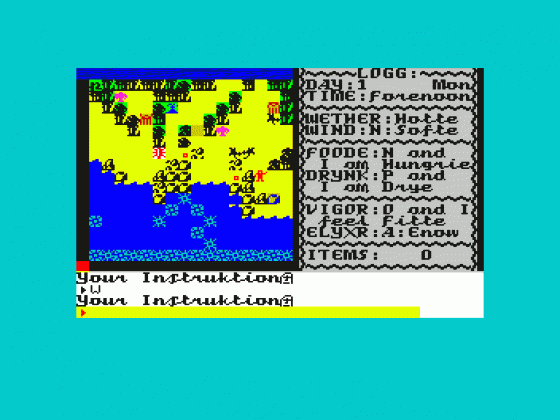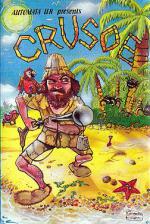Crusoe
Automata made their name with an unusual adventure, Pimania, and with the first serial cartoon advertisements exhibiting their own unique good humour and lightheartedness - a refreshing interlude from the unremitting commercial onslaught emanating from other software houses. Pimania has achieved notoriety, and lately, newsworthiness over the extreme lengths many will take to recover the Golden Sundial of Pi from its depository deep within a long forgotten oceanic nuclear bunker. I've even known some to go so far as to play the adventure.
Crusoe is based upon the novel by Daniel Defoe and features free music on the flip side by Dan Defoe and the Castaways but turns out to be a desert island discs spoof with passable musical adverts for Automata products. The star of the show has a high pitched voice with an enchanting Scottish lilt. Crusoe is stranded on a remote island in Yorkshire (Hull?) In the year 1684, with nothing but an empty stomach, a bottle of granny's patent elixir and the shorts he stands up in. The aim is to return home and steer the litigation against your travel agent through court.
The game, following an attractive loading screen, is very colourful and is dominated by the playing area on the left which depicts the palms, islands, fruit trees, cacti, monsters and treasures that will help or hinder you in your quest. To the right is The Logg with Day, Time, Weather, Wind, Food & Drink, Vigour, Elixir and Items down one side opposite which is first, the letter which must not run too far up the alphabet for safety's sake, and then a comment like 'and I feel fine'. This seventeenth century notation adds an authentic flavour to the proceedings and no doubt conceals any propensity towards misspelling. Prepare yourself for the culture shock by learning these few words - fitte, wether, foode, rekt, werie.

Along the bottom goes your input and the comment it elicits above. The cassette cover amusingly keeps the tenuous links with the mainstream adventure by calling I (for Inventory) 'What have I got?', SCORE 'Will I survive?' and D, Describe. You move around by pressing the N, S, E, and W keys, waiting for the response each time but surely cursor key movement would have been much better and have removed a major irritation from the game. To be fair movement is facilitated by holding down ENTER which allows you continuous movement in the direction previously specified.
When negotiating obstacles the manoeuvres of the monsters about the screen can be a distraction as you cannot progress further until the monster has moved. The delay can disrupt the rhythm of your input resulting in a load of nonsense e.g., EEN when you thought you had separately moved east twice, then north. This shortcoming is compounded by the absence of DELETE and so whatever gibberish you end up with must be entered.
As is more typical of a Yorkshire island than one in the desert, rain stops play. If you can dodge the assorted monsters, crocodiles, spiders, serpents, etc., and find some fruit trees, and perhaps a pool of water, you will find yourself crossing into new maps where you might well find a dead end. Often the way out is to press the Blue key (1) and enter the sea where you can swim along merrily with only the serpents posing any threat. The sea washes against the bottom of the map and is useful for crossing map boundaries quickly until you meet a construction forcing you onto land or serpent-infested waters. Here lies a minor bug. If you tire of swimming, or if the serpent should get you, and you die, you continue with your next life where you left off. However, you set off again in the Red key (2) land mode. The solution is simple enough - press the Blue key once more.

When you come to a sticky end all is not lost by any means. You have twenty or so lives left - there's that Automata humour again. Your rejuvenation is effected on imbibing the elixir. The next time you die you look forward 'to the musical accompaniment with the suitably sad end; a dud note.
Crusoe is a very different type of adventure that will take a lot of playing before that which you are supposed to achieve becomes clear. It will appeal to that group of players who find text adventures too demanding and unexciting, and like their games served up with a sense of humour.
Summary
Difficulty: How long is a piece of string?
Graphics: Shows map of island on which your character Crusoe is moved from block to block
Presentation: Very good
Input Facility: No delete, irritating
Response: Fast but replies often confusing
Special Features: The game is difficult to categorize, not a traditional style adventure
Criticism
General Rating: Fair.


 1st November 1984
1st November 1984


